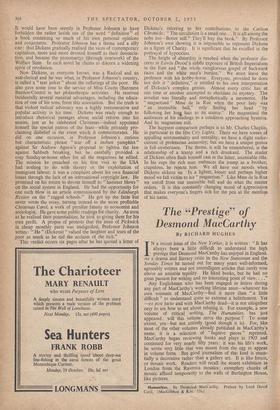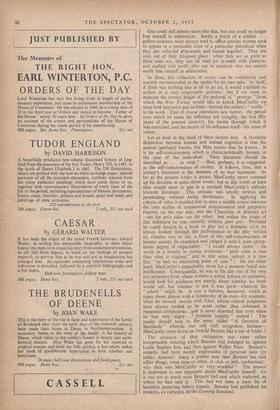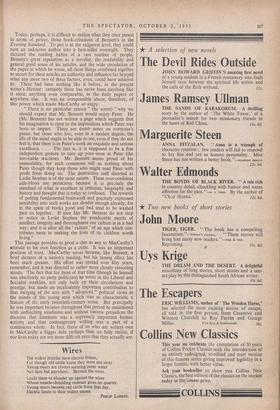The "Prestige" of Desmond MacCarthy
By RICHARD HUGHES IN a recent issue 'of the New Yorker, it is written : " It has always been a little difficu't to understand the high prestige that Desmond MacCarthy has enjoyed in England. As a drama and literary critic in the New Statesman and the Sunday Times he turned out for many years well-informed, agreeably written and not unintelligent articles that rarely rose above an amiable tepidity. He liked books, but he had no great passion for writing and no interesting point of view. . . ." Any Englishman who has been engaged in letters during any part of MacCarthy's working lifetime must—whatever his own estimate of MacCarthy—find it more than " a little difficult " to understand quite so extreme a belittlement. Yet —ex post facto and with MacCarthy dead—it is not altogether easy to, see how to set about refuting it. For example, a new volume of critical writing, The Humanities, has just appeared : will this volume serve the purpose ? To some extent, yes—but not entirely (good though it is). For, like most of the other volumes already published in MacCarthy's name, it is a selection of " fugitive pieces " reprinted. MacCarthy began reviewing books and plays in 1903 and continued for very nearly fifty years : it was his life's work, he wrote very little that was meant from the egg to appear in volume form. But good journalism of this kind is essen- tially a decorative rather than a gallery art. It is like fresco, or mosaic work. Readers will recall the recent exhibition in London from the Ravenna mosaics : exemplary chunks of mosaic affixed temporarily to the walls of Burlington House, like pictures.
Humanities. By Desmond MacCarthy. Preface by Lord David Cecil. (MacGibbon & Kee. 15s.)
One could still admire them like that, but one could no longer lose oneself in admiration. Surely a touch of a similar . . . gallery-sickness must always tend to afflict articles written each to appear in a particular issne of a particular periodical when they are collected afterwards and bound together. They are seen out of their designed place : when they are as good as these ones are, they can be read (or re-read) with pleasure, and studied with profit; they can be admired—but one cannot easily lose oneself in admiration.
In short, this collection of essays can be confidently and warmly recommended to the reader for its own sake : by itself, if there was nothing else at all to go on, it would establish its • author in a very respectable position : but if we want to measure the correct height of the pedestal of " prestige " from which the New Yorker would like to knock MacCarthy we must look beyond it and its kind—beyond the author's " works " to his work. That of course introduces new factors : the period over which he made his influence felt (roughly, the first fifty years of the present century), the media through which it was exercised, and the nature of his influence itself—his sense of values.
Let us look at the third of these factors first. A favourite distinction between human and animal cognition is that the animal (perhaps) knows, but Man knows that he knows. It is his self-consciousness which is characteristically human, in the case of the individual. Then literature should be described as . . . as what ? —Best, perhaps, it is suggested, as the self-consciousness of society. It follows, then, that a society's literature is the measure of its true humanity. So far as the present writer is aware, MacCarthy never summed up his doctrine in quite those words; but-to this writer at least they would seem to put in a nutshell MacCarthy's attitude towards literature. This attitude was wholly serious and penetrating without being doctrinaire. In applying his criteria of value it enabled him to steer a middle course between the twin scyllas of commercial entertainment and purposive rhetoric on the one side, and the Charybdis of abstract art —art for art's sake—on the other: but within the scope of this definition he was virtually without parti pris. Provided he could discern in a book or play (as a dramatic critic he always looked through the performance to the play behind it), whether new or old, a facet of this self-consciousness of human society, he examined and judged it with ia.quite excep- tional degree of impartiality : " I would always rather "—he wrote in a homily to young . reviewers—" print what is true than what is original," and in that sense, indeed, it is true that " he had no interesting point of view " ! On the other hand, MacCarthy's impartiality never for a moment faded into indifference. Consequently, he was in his day one of the very few reviewers from whose reviews a writer, known or unknown, would look for guidance not merely about whether his book would sell, but whether or not it was good—whatever his " school " might be. It was a fairness, moreover, which at times shone almost with a luminosity of its own—for example, when he crossed swords with Eliot, whose critical judgments have always tended to be acute rather than unbiased, it remained conspicuous : and it never deserted him even when he was very angry. " Amiable tepidity " indeed ! The reader should turn to the essay called " A Question of Standards " wherein--but still with scrupulous fairness— MacCarthy came down on Arnold Bennett like a ton of bricks !
The occasion of that castigation was some rather irresponsible sneering which Bennett had indulged in, against Leslie Stephen first, and then against Walter Pater. Bennett's remarks had been merely expressions of personal taste (or rather, distaste) : many a greater man than Bennett has said sillier things, some time or other, in club or pub, unchastised : why then was MacCarthy so very wrathful ? The answer is important to our argument about MacCarthy himself : for it was not so much what Bennett had said which mattered, as where he had said it. This had not been a mere bit of harmless posturing before friends : Bennett had published his remarks, ex cathedra, in the Evening Standard. Today, perhaps," it is difficult to realise what they once meant in terms of power, those book-criticisms of Bennett's in the Evening Standard. To put is at the vulgarest level, they could turn an unknown author into a best-seller overnight. They dictated the reading habits of a vast number of people. Bennett's great reputation as a novelist, the readability and general good sense of his articles, and the wide circulation of the paper in which he wrote, all three things combined together to secure for these articles an authority and influence far beyond what any mere two of these factors, even, could have attained to. There had been nothing like it before, in the present writer's lifetime : certainly there has never been, anything like it since, anything even comparable, in the daily papers or anywhere else. It was an irresponsible abuse, therefore, of this power which made MacCarthy so angry : " There is no particular reason " (he wrote) " why we should expect that Mr. Bennett would enjoy Pater. He (Mr. Bennett) has not written a page which suggests that his imagination is open to the impressions which Pater was born to impart. There are dumb notes on everyone's piano, but those who live, even in a modest degree, the life of the mind ought to, be able to see, even if they do not feel it, that there is in Pater's work an exquisite and serious excellence. . . . The fact is, it is supposed to be a fine independent gesture to turn up your nose at Pater (the inevitable reaction). Mr. Bennett seems proud of his insensibility, for such comments tell us nothing about Pater though they keep those who might read Pater with profit from doing so. The destructive sniff directed at Leslie Stephen is of the same nature. These over-confident side-blows are pernicious because it is precisely the standard of what is excellent in criticism, biography and history and thought that is today so confused. The rewards of putting fundamental brainwork and precisely expressed sensibility into such works are slender enough already, for in the spate of books good and bad tend to be washed past us together. If men like Mr. Bennett do not stop to notice in Leslie Stephen the ponderable merits of intellect, integrity and thoroughness our culture is in a bad way; and it is after all the ' culture' of an age which con- tributes' most to making the lives of its children worth living."
This passage proyides as good a clue as any to MacCarthy's attitude to his own function as a critic. It was an important position of trust. MacCarthy never became, like Bennett, a brief dictator of a nation's reading, but his lasting effect has been much greater. His effort was spread over fifty years, remember, and it was directed to rather more closely reasoning minds. The fact that for most of that time (though he himself was absolutely no party politician) he wrote in the Liberal and Socialist weeklies, not only built up their circulations and prestige, but made an incalculably important contribution to that merging of the arts with " advanced " political views in the minds of the young men which was so characteristic a feature of the early twentieth-century scene. But principally he was important because throughout that period he maintained with unflinching steadiness and without narrow prejudices the doctrine that literature was a supremely important human activity and that contemporary writing was a part of a continuous whole. In fact, those of us who are writers owe to MacCarthy a bigger debt perhaps than we fully realise, if our lives today are not more difficult even that they actually are.




















































 Previous page
Previous page